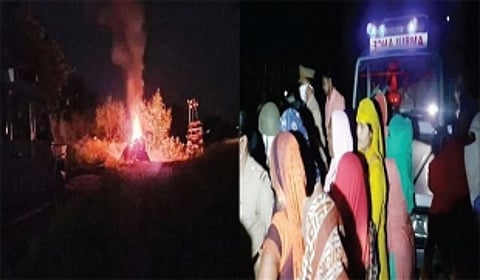

She was raped as she went over to the field to collect fodder. Injuries sustained during the attack resulted in injuries to her spine and it was alleged the culprits gouged her eyes and cut her tongue during the brutal rape. The victim was shifted to Delhi’s Safdarjung Hospital on September 29th and died a day later. On Tuesday late night, the police stepped. Locals charged that she was cremated while ensuring none of the family members was present. This was yet another dark chapter in the history of women being criminally brutalized by beasts who call themselves men. The death sentence for gang rapes has not proved to be a deterrent. The entire chain of events caused much anger and frustration in Goa.
Sabina Martins spokesperson of Bailancho Saad
said there were no words to condemn the rape and the decision by the police to conduct
the funeral without the family being present. She said “The justice system has
failed, today being a Dalit does not guarantee you justice. The authorities
committed one crime and then made it worse by not allowing them to be present
at their daughter’s funeral”.
To avoid such a situation ever reoccurring she
said it was important to ensure the authorities moved quickly. The registration
of the case and the collection of the evidence would have to be done
professionally. She said “The problem is that when a situation like Nirbhaya
occurs, everyone’s conscience is pricked and then everyone goes back to sleep.
Attitudes have not changed. Compensation to minor rape victims takes time and
there is a distinct absence of sympathy.” She added that now with the
death penalty, victims of rape were being assaulted badly and usually killed.
Albertina Almeida lawyer and human rights
activist said “We are now looking at the systemic support for these crimes by
the system. I feel the police needs to respond immediately. When we go to
report an assault, they question us and sometimes say if specific action is
initiated then it could cause a law and order problem. Now this cremation that
was done at night because the authorities would have claimed it would cause a
law and order problem if it was held in the day. Please remember the laws are
all in place. It has to be implemented and importantly the biases in the system
against gender, class, caste have to be addressed. You have to understand the
ruling dispensation is showing its biases against sections of the minorities
society. The laws like I said are all good but the men have to do it. They have
to be sensitized and it works in other cases it just doesn’t.
Caroline Collasso of the Human Rights Law
Network said the laws had been tightened after the Nirbhaya case. She said “The
death penalty was made sure for gang rapes. It was thought to be a deterrent
but that is not the case. The problem is investigations are still lacking. We
do not have a separate force for investigating a crime. The same force is used
for Bandobast and then they have to investigate murders. One can access so much
of information from a rape victim but the process here is still not up to the
mark. Fingerprinting is still rudimentary. Then there are delays in court and
if one wins after five years it means nothing”.
Saranga Ugalmugle,
practicing lawyer in the High Court of Bombay at Goa felt very few cases of
rape were actually reported. It was important to ensure an environment
which was conducive for women to feel safe enough to report it. She said
“However, even when cases are reported, we see impunity of the kind that we are
witnessing in the UP case. So what we do need is the strengthening of legal
mechanism to ensure that victim/survivors feel safe enough to report and the
confidence that the complaint would actually lead to some justice. For that,
there also needs to be sensitisation of the doctors, police (investigative
authorities) and well as lawyers and judges. Often the processes of law are
themselves unjust. There need to have processes which tackle the hurdles faced
by the victim/survivors and their families. But most particularly in cases like
these, we need to start by acknowledging that it's a caste-based atrocity.
Women are targets of sexual violence, but the stigma and oppression faced based
on the social identities apart from gender alone are often worse”. She felt
even if the JVC recommendations were not fool proof, they were at least in a
better direction.
She said “ The Justice
Verma Committee in its Jan 2013 report, after due consultation came up with
various recommendations for amendment in the criminal laws around rape.
However, the Criminal Law Amendment Act of 2013 came up with entirely different
and extremely problematic changes. There is a need to revisit JVC
recommendations. The death penalty can possibly not be a solution, given the
right to life even of the accused and the very serious concerns of giving power
to the state to sanction deaths in name of women's safety. There is a need to
address rape culture with societal as well as structural transformation”
Goans have sent a clear message -Hathras or Harmal, (Arambol) India must stop the violation of
its women at once.
A change in attitudes are fundamental and
one can only hope there is light at the end of a very long tunnel. Cause the
present is nothing to be proud of.